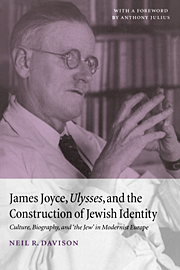 James Joyce, Ulysses, and the Construction of Jewish Identity
James Joyce, Ulysses, and the Construction of Jewish Identity Book contents
- Frontmatter
- Contents
- Foreword by Anthony Julius
- Acknowledgements
- List of abbreviations
- Introduction
- 1 Silence: family values
- 2 Silence: Jesuit years – Clongowes and Belvedere
- 3 Silence: university years – the Church, Dreyfus, and aesthetics
- 4 Exile: excursion to the Continent, bitter return
- 5 Cunning and exile: Greeks and Jews
- 6 Cunning: Jews and the Continent – texts and subtexts
- 7 Cunning: the miracle of Lazarus times two – Joyce and Italo Svevo
- 8 Ulysses
- Conclusion
- Notes
- Select bibliography
- Index
1 - Silence: family values
Published online by Cambridge University Press: 05 April 2012
- Frontmatter
- Contents
- Foreword by Anthony Julius
- Acknowledgements
- List of abbreviations
- Introduction
- 1 Silence: family values
- 2 Silence: Jesuit years – Clongowes and Belvedere
- 3 Silence: university years – the Church, Dreyfus, and aesthetics
- 4 Exile: excursion to the Continent, bitter return
- 5 Cunning and exile: Greeks and Jews
- 6 Cunning: Jews and the Continent – texts and subtexts
- 7 Cunning: the miracle of Lazarus times two – Joyce and Italo Svevo
- 8 Ulysses
- Conclusion
- Notes
- Select bibliography
- Index
Summary
I sometimes think that it was an heroic sacrifice on [the Jews'] part when they refused to accept the Christian revelation. Look at them. They are better husbands then we are, better fathers and better sons.
Joyce's comment from 1920 suggests an historical sense of Otherness as well as a grave concern with traditional familial roles – both prime aspects of Leopold Bloom's subjectivity – as essential traits in his construction of “Jewish nature.” While the statement stereotypes Jews, it also indicates Joyce's fascination with one of many discourses about “the Jew” that witnessed a renewed intensity during the Modernist era. Leopold Bloom is, of course, Joyce's mature depiction of his era's marginal Jew. Joyce's interest in “the Jew,” however, was established long before he ever wrote Ulysses; indeed, his curiosity involved nearly a lifetime of notions surrounding the “mysterious Other” first introduced into his imagination through Catholic doctrine. The statement above, in fact, reveals how even as an adult, Joyce on occasion still conceived “the Jew” within the context of the Christian discourse he absorbed in Dublin.
As he was a devout child, Joyce as a youngster had to grapple with contradictions between the Church's condemnation of the Jews and its imperatives of charity and forgiveness. That incongruity sat at the center of his earliest mental constructions of “the Jew”; but although Joyce rose above Catholic stereotypes as an adult, he never lost interest in the ambiguity of the representations that fostered those earliest notions. Educated as a Catholic in an era that exacerbated age-old Judeophobia through political, social, and pseudo-scientific arguments, Joyce would ultimately employ “the Jew” to investigate and censure the discourse of religious prejudice, chauvinistic nationalism, and biologically-based racism.
- Type
- Chapter
- Information
- James Joyce, Ulysses, and the Construction of Jewish IdentityCulture, Biography, and 'the Jew' in Modernist Europe, pp. 16 - 40Publisher: Cambridge University PressPrint publication year: 1996


